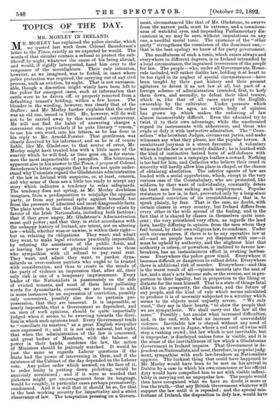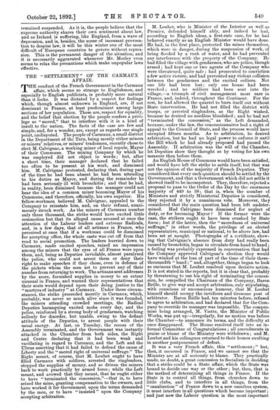TOPICS OF THE DAY.
MR. MORLEY IN IRELAND.
MR. MORLEY has explained the police circular, which we quoted last week from Colonel Saunderson's letter to the Times, exactly as we expected he would. The words of that circular contain a refusal to protect the sub- Sheriff by night, whatever the cause of his being abroad, and would, if rigidly interpreted, hand him over to the vengeance of the moonlighters. Their only intention, however, as we imagined, was to forbid, in cases where police protection was required, the carrying out of any civil process, such as eviction, by night. That is not unreason- able, though a discretion might wisely have been left to the police for emergent cases, such as information that cattle were to be driven off, or property removed from a defaulting tenant's holding, within a few hours. The blunder in the wording, however, was clearly that of the drafter; and Mr. Morley further explains that the order was an old one, issued in 1886. He, however, will do well not to be carried away by this successful controversy. He will not find the habit of answering charges a convenient one, particularly if he puts literary "venom," to use his own word, into his letters, as he has done in his reply to Mr. Arnold-Forster. That gentleman was clearly deceived by his informant, and as he is of course liable, like Mr. Gladstone, to that source of error, Mr. Morley might have treated him with a little more of the suavity which he will find, as time goes on, is for states- men the most impenetrable of panoplies. His bitterness, apparent also in his answer to the Times, a propos of Colonel Saunderson's letter, suggests that he does not quite under- stand why Unionists regard the Gladstonian administration of the law in Ireland with suspicion, or, at least, concern, and why some of them are a little too ready to accept any story which indicates a tendency to relax safeguards. The tendency does not spring, as Mr. Morley doubtless imagines, from a predisposition to misjudge the opposite party, or from any personal spite against himself, but from the pressure of admitted and most disagreeable facts. The plain truth is, that the Gladstone Ministry exists by favour of the Irish Nationalists, including both factions ; that if they grow angry, Mr. Gladstone's Administration must quit power ; and that they, in strict accordance with the unhappy history of Ireland, are intent, not on altering law—which, whether wise or unwise, is within their right— but on relaxing its obligations. They want, and admit they want, to make legal evictions practically impossible, by refusing the assistance of the public force, and so leaving the power of physical resistance to those who sympathise with all refusal to pay rural rent. They want, and admit they want, to pardon dyna- mitards as over-zealous patriots who ought to be treated with consideration, and thus to create in the minds of the party of violence an impression that, after all, their only risk is one of a temporary imprisonment. Every leader of the Nationalists is passionately on the side of evicted tenants, and most of them have palliating words for dynamitards, covered, we are bound to add, in some instances by an expression of conviction, possibly only convenient, possibly also due to partisan pre. possession, that they are innocent. It is impossible, or nearly impossible, that a Government so dependent, and on men of such opinions, should be quite impartially judged when it seems to be swerving towards the direc- tion in which such opinions tend. Every Government tends to "conciliate its masters," as a great English wirepuller once expressed it ; and it is not only natural, but right, that when the administration of the law is concerned, and great bodies of Members, with the balance of power in their hands, condemn the law, the action of Ministers should be jealously watched. It would be just the same as regards Labour questions if the State had the power of intervening in them, and if the existence of the Cabinet of the day depended on the Labour vote. Any police order which seemed, on the face of it, to order lenity in putting down picketing, would be anxiously scrutinised ; and if it were so worded that picketers might get encouragement from its language, would be roughly, in particular cases perhaps prematurely, condemned. And it is well that it should be so, for that is the best working security for impartiality and a strict observance of law. The temptation pressing on a Govern- ment, circumstanced like that of Mr. Gladstone, to swerve from the narrow path, must be extreme, and a conscious- ness of watchful eyes, and impending Parliamentary dis- cussions is, we may be sure, without imputations on any one, a needful moral tonic. The existence of the "other party" strengthens the conscience of the dominant one,— that is the best apology we know of for party government.
The needfulness of such a tonic, which exists always and everywhere in different degrees, is in Ireland intensified by a local circumstance, the ingrained irreverence of the people for law. The people—who, under all Governments, Home- rule included, will rather dislike law, holding it at heart to be too rigid in its neglect of special circumstances—have been taught by their past history and their present agitators to detest it as not law at all, but part of a, foreign scheme of administration intended, first, to keep them down, and secondly, to defeat their ideal tenure, which is, like that of all races except the English, ownership by the cultivator. Under pressure which has continued for ages, an entire body of opinion has grown up which makes the enforcing of law almost inconceivably difficult. Even the educated try to twist it to their own advantage, while the uneducated regard its instruments with abhorrence, and those who evade or defy it with instinctive admiration. The " Coun- sellors " who browbeat Judges, circumvent juries, and make witnesses say what they please, are the popular heroes. A recalcitrant juryman is a street favourite. A voluntary witness for the law is not merely disliked ; he is loathed with the kind of instinctive hatred born of self-defence with which a regiment in a campaign loathes a coward. Nothing is too bad for him, and Catholics who believe their creed in sincerity will hardly allow him place in chapel, or the chance of obtaining absolution. The inferior agents of law are loaded with a social opprobrium, which, except in the very curious case of the Constabulary, who are protected, like soldiers, by their want of individuality, constantly deters the best men from seeking such employment. Popular resistance to law is, in fact, prevented only by a long-since ascertained conviction of its irresistibleness ; that is, to speak plainly, by fear. That is the case, no doubt, with certain classes in every country, but Ireland differs from every other in the wide spread of the feeling, and in the fact that it is shared by classes in themselves quite inno- cent; the very priesthood very often, as regards the land laws, hardly differing in opinion from the men whom they feel bound, by their own religious law, to condemn. Under such circumstances, if there is to be any operative law at all—and no people has ever yet dispensed with one—it must be upheld by authority, and the slightest hint that authority is asleep, or powerless, or inclined to favour law- breakers, has an instantaneous effect in evoking lawless- ness. Everywhere the police grow timid. Everywhere it becomes difficult or dangerous to collect debts. Everywhere there is additional risk of murder. Everywhere—and this is the worst result of all—opinion mounts into the seat of law, and a man's acts become safe, or the reverse, not in pro- portion to their legality, but in proportion to the liking or distaste for the man himself. That is a state of things fatal alike to the prosperity, the character, and the future of any people, and the kind of rule which seems calculated to produce it is of necessity subjected to a scrutiny which seems to its objects most unjustly severe. "We only want," they say in their hearts, "to show the people that we are sympathetic. We shall carry out the law all the same." Possibly ; but amidst what increased difficulties, and, in the end, with what an increase of unavoidable violence. Inevitable law is obeyed without any need of violence, as we see in Japan. where a red cord of twine will stop a rushing crowd ; but law which is not inevitable, but is unpopular, is disobeyed unless force is visible, and it is the sense of the inevitableness of law which a Gladstonian Government in Ireland impairs. That Government is de- pendent on Nationalists, and must, therefore, in popular j udg- ment, sympathise with such law-breakers as Nationalists approve. The luckiest thing that could have happened to Mr. Morley would have been to be met on his arrival in Dublin by a case in which his own conscience or his official duty would have compelled him to act with visible inflexi- bility in carrying out an unpopular law. The people would then have recognised what we have no doubt is more or less the truth,—that any British Government whatever will support the law until it is repealed ; and the special mis- fortune of Ireland, the disposition to defy law, would have remained suspended. As it is, the people believe that the supreme authority shares their own sentiment about law, and as Ireland is suffering, like England, from a wave of depression, and is, besides, the scene of incessant provoca- tion to despise law, it will be this winter one of the most difficult of European countries to govern without repres- sion. This is the permanent danger of the situation, and it is necessarily aggravated whenever Mr. Morley even seems to relax the precautions which make unpopular laws effective.







































 Previous page
Previous page